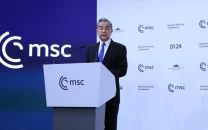Public hospitals hand out shelf-sliced drugs
As per DRAP rules, the minimum shelf life for hospital-supplied medicines should be at least six months to one year

The procurement of medicines in Sindh’s public hospitals remains mired in controversy due to repeated violations of established regulations, with many healthcare facilities stocking up on near-expiry drugs in an attempt to curtail expenditures.
Despite clear rules against the purchase of near-expiry drugs, hospitals continue to buy medicines with shorter shelf lives as they are significantly cheaper compared to those with longer expiry durations. These low-cost purchases are a recurring issue in the province, raising questions about transparency and patient safety.
As per the policies of the Drug Regulatory Authority of Pakistan (DRAP), the minimum shelf life for hospital-supplied medicines should be at least six months to one year therefore, medicines with an expiry date within 2–3 months should not be procured. Despite these guidelines, there is no robust mechanism in place to ensure compliance in hospitals across Sindh.
Each year, various reports highlighting irregularities worth billions of rupees in medicine procurement surface across Sindh’s public hospitals. Although regulations concerning expiry dates exist for the purchase of medicines, many hospitals still acquire near-expiry drugs. Experts have revealed that there is a clear cost difference between short-expiry and long-expiry medicines, which often drives this unethical practice.
According to pharmaceutical experts, medicines nearing their expiry dates are usually sold at drastically reduced rates. These purchases are carried out in a highly organized and technically complex manner, making them difficult to trace or prove. The Central Procurement Committee, responsible for 75 per cent of medicine purchases in Sindh, oversees the process based on hospital demand and also determines pricing. The remaining 25 per cent of procurement is handled locally by hospitals or district health offices under their local purchasing authority.
Dr Ubaid Ali, Head of Sindh Operations at the Drug Regulatory Authority, confirmed that significant price differences existed between short and long-expiry medicines. “While medicines are safe to use before expiry, their potency diminishes over time. This is why short-expiry drugs are cheaper and often preferred in bulk procurement, despite the risks. Although non-expired drugs are legally usable, consistent procurement of near-expiry drugs compromises quality care, especially in public healthcare settings where patients already face resource constraints,” noted Dr Ali.
Medications procurement is done through tenders, primarily under the authority of the Central Procurement Committee, a 26-member body that also approves or rejects bids. Tenders are issued under the generic name of the formulation (chemical composition), and medicines tenders are awarded to the companies offering the lowest rates.
In recent times however, a troubling trend has emerged: medicines are often procured from lesser-known companies under generic formulations, rather than established brands. Once a formulation is purchased at a set price, other hospitals are directed to buy the same drug at the same rate, regardless of brand reputation or therapeutic effectiveness. Meanwhile, the public continues to buy drugs in the open market under trade names, leading to a disconnect between institutional and retail standards.
Recently, the Sindh Assembly’s Public Accounts Committee (PAC), chaired by Nisar Khuhro, convened a meeting to review medicine procurement practices in government hospitals. The committee raised serious questions about the purchasing mechanism. In response, Health Secretary Rehan Iqbal Baloch informed PAC that tenders were issued through the Central Procurement Committee, and medicines were procured based on merit and transparency.
It is worth noting that the Drug Act of 1976 and the DRAP Act of 2012 list strict penalties for selling expired medicines, including up to five years in prison, heavy fines, cancellation of drug licenses, and legal action. However, in the absence of a national pharmacopoeia, regulatory enforcement remains weak. Presently, Pakistan has 900 registered formulations, including 400 classified as essential (life-saving) and 500 as non-essential.
Hence, ongoing practices and repeated complaints suggest that urgent reforms are needed in procurement oversight to ensure patient safety and regulatory compliance.




















COMMENTS
Comments are moderated and generally will be posted if they are on-topic and not abusive.
For more information, please see our Comments FAQ